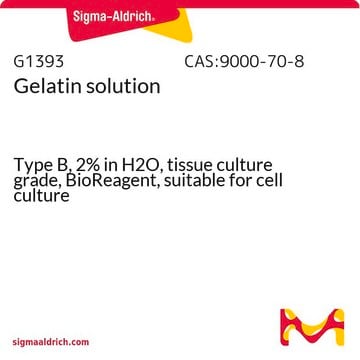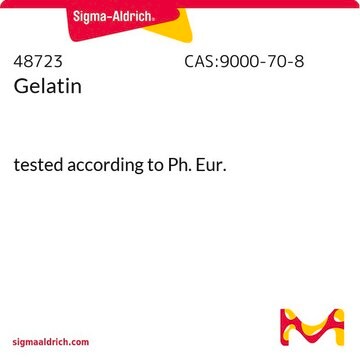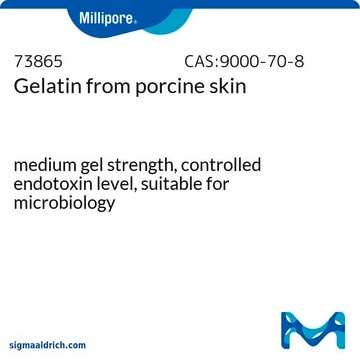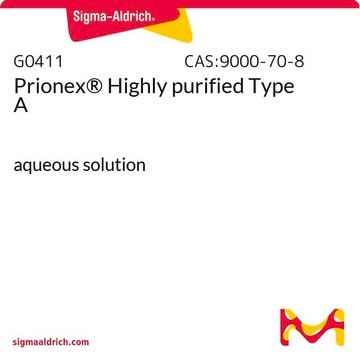G9136
Porcine Gelatin
from porcine skin, Type A, powder, γ-irradiated, suitable for cell culture, BioXtra
About This Item
Productos recomendados
product name
Gelatina from porcine skin, Type A, lyophilized powder, γ-irradiated, BioXtra, suitable for cell culture
biological source
Porcine skin
Quality Level
sterility
γ-irradiated
type
Type A
product line
BioXtra
form
lyophilized powder
packaging
pkg of 10 mg
technique(s)
cell culture | mammalian: suitable
surface coverage
100‑200 μg/cm2
gel strength
~300 g Bloom
solubility
soluble 20 mg/mL, clear, colorless (in warm tissue culture medium)
shipped in
ambient
storage temp.
room temp
¿Está buscando productos similares? Visita Guía de comparación de productos
Application
Gelatin has been used in many applications. It has use in coating cell culture to improve attachment of cells, being added to PCR to stabilize Taq DNA, as a blocking reagent in Western blotting, ELISA, and immunochemistry, and as a component of media for species differentiation in bacteriology. As a biocompatible polymer, it has used as a delivery vehicle for release of active biomolecules and in generation of scaffolds for tissue engineering applications. In the pharmaceutical industry, geltan can be used as a suspending and encapsulating agent, among other applications.
Components
Caution
Preparation Note
This product is a type A lyophilized powder, suitable for cell culture, with a gel strength of 300.
Storage Class
11 - Combustible Solids
wgk_germany
nwg
flash_point_f
Not applicable
flash_point_c
Not applicable
ppe
Eyeshields, Gloves, type N95 (US)
Certificados de análisis (COA)
Busque Certificados de análisis (COA) introduciendo el número de lote del producto. Los números de lote se encuentran en la etiqueta del producto después de las palabras «Lot» o «Batch»
¿Ya tiene este producto?
Encuentre la documentación para los productos que ha comprado recientemente en la Biblioteca de documentos.
Los clientes también vieron
Artículos
Cancer stem cell media, spheroid plates and cancer stem cell markers to culture and characterize CSC populations.
Protocolos
This gelatin coating protocol for cell culture applications offers information regarding types of gelatin, surface coverage concentration, and tips for optimization.
Nuestro equipo de científicos tiene experiencia en todas las áreas de investigación: Ciencias de la vida, Ciencia de los materiales, Síntesis química, Cromatografía, Analítica y muchas otras.
Póngase en contacto con el Servicio técnico














